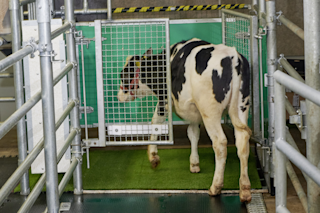Paul Nurse, a geneticist and the President of the UK's Royal Society, gave an address last month titled, "Advising Society on Science." He discusses the most controversial issues that characterize public debate on climate change and genetically modified foods. Much of what he says strikes me as thoughtful and reasonable, though I see his comments on climate science has elicited mostly disapproval from the host of a twitchy climate skeptic blog and frothy denunciations from his choir. Shocking! Anyway, below is an excerpt of Nurse's comments on climate change and following that, his entire discussion on GMOs. *** A feature of this [climate change] controversy is that those who deny that there is a problem often seem to have political or ideological views that lead them to be unhappy with the actions that would be necessary if global warming is due to human activity. These actions are likely to include measures such as greater concerted world action, curtailing the freedoms of individuals, companies and nations, and curbing some kinds of industrial activity, potentially risking economic growth. What appears to be happening is that the concerns of those worried about those types of action, have led them to attack the scientific analysis of the majority of climate scientists with scientific arguments that are rather weak and unconvincing, often involving the cherry picking of data. What can be learnt from the climate science and global warming controversy about giving scientific advice to society? Firstly it reinforces the points already made about the importance of relying on the consensus view of expert scientists and the need to avoid the cherry picking of data and argument. But it also emphasises the need to keep the science as far as is possible from political, ideological and religious influence. I know that can be difficult, as after all, scientists are only human, but that is what good scientific analysis needs. Several other features have complicated the situation. One has been a failure of some climate scientists to be as open as they should in making all their data available, for example in predicting the extent of future rises in temperature. This has led some who deny there is a problem to claim that the climate scientists data is wrong or has been manipulated. Another feature is the complexity of climate science which leads to uncertainties. In a world where people often want simple answers, uncertainty does not appeal. This allows space for poorly evidenced but confidently stated opinions, which are sometimes mixed with personal attacks and misrepresentations to attract public and political attention. A second controversial area has been the discussions around genetically modified (GM) foods, that is the introduction of genes by genetic engineering into crop plants. The consensus view of the majority of expert plant and other scientists is that in principle this is a safe approach and can lead to considerable benefits, not only commercial ones such as reducing food spoilage during transport for example, but also to help tackle global problems such as world hunger by increasing crop yields and the use of marginal habitats for crop growing. These scientists would also usually argue that precautionary checks need to be in place but in general these should be similar to those used for conventionally produced crop plants that is using a case by case specific plant basis to determine safety and effectiveness. This consensus scientific view has been accepted by the public in some countries but in others it has not. Again why is this the case? In my view the key features of this controversy that need to be considered are peoples' sensitivities about what they eat, concerns about scientists playing at God, and worries about the influence of over bearing commercial interests. These have converged to generate deep suspicion amongst some of the public about GM foods. Human beings have a tendency to be conservative, even fearful, about what their food contains. One anxiety I noticed was frequently expressed during public consultation exercises over GM crops was a concern at "˜eating food containing genes'. This was an issue a scientist was unlikely to have considered but was a perfectly reasonable one for a member of the public to express. This concern was exacerbated by newspaper headlines calling GM crops Frankenstein Foods, conjuring up images of white coated scientists playing God and tampering with the purity of food. Another feature is often those who object to GM have political or ideological opinions which dislike the power yielded by powerful commercial corporations behind the manufacture of certain GM crops. These anti GM opinions have been adopted by some environmental NGOs who campaign against the use of GM crops, even when their use is aimed at serving the public good such as reducing vitamin deficiency in children for example. What can be learnt from the public debate concerning the use of GM crops? First, it is clear that there has been a failing to properly engage the public and pay attention to what they say. Scientists have to listen to the public to be completely aware of their concerns and of the questions they want answered by the scientific advice. Scientists and single interest pressure groups are not always the best individuals to frame these questions. Second, is the need for high quality debate in the mass media. Scientists need to be part of this debate from the very beginning to ensure that it is based on evidence and rational argument rather than ideology or politics. Third, scientific advice is best delivered by scientists who are impartial, rather than those who may have other motives. This can be the case for a company trying to promote use of GM, or NGOs attacking GM crops who rely on the support of individuals ideologically opposed to such technologies.
When Scientists Advise on Politically Charged Issues
Explore the climate change controversy and its impact on public perception of scientific advice in a divided society.
More on Discover
Stay Curious
SubscribeTo The Magazine
Save up to 40% off the cover price when you subscribe to Discover magazine.
Subscribe












